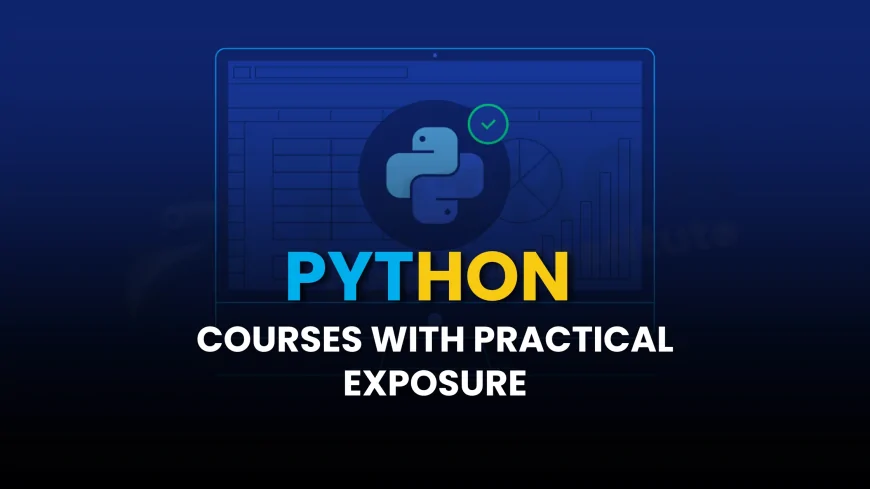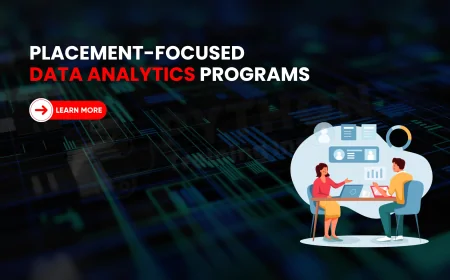Python Courses with Practical Exposure in Pune | Python Classes with Live Project Experience
Join the best Python courses with practical exposure in Pune. Learn hands-on coding, build real-world projects, and become a job-ready Python developer.

Table of Contents
- Overview
- Why Practical Exposure is Crucial
- Who Should Join These Courses?
- What You’ll Learn
- Tools and Technologies Covered
- Types of Practical Projects Included
- Course Highlights
- Top Institutes Offering Practical Python Courses in Pune
- Course Duration and Fees
- Certification and Career Scope
- FAQs
- Conclusion
Overview
Python courses with practical exposure in Pune are designed for those who want to move from theory to application. Whether you're a beginner or an experienced professional, learning by doing ensures you can build software, automate tasks, or transition into Python-based careers in development, data science, AI, or automation testing.
Why Practical Exposure is Crucial
- Improves Retention: Hands-on coding helps you internalize syntax, logic, and problem-solving faster.
- Job Readiness: Employers prefer candidates who’ve built real projects using Python, not just watched tutorials.
- Builds Confidence: Working on live code prepares you to debug, deploy, and explain your logic in interviews.
- Portfolio Development: Showcasing practical projects on GitHub or LinkedIn gives you a competitive edge.
Who Should Join These Courses?
- Engineering students seeking internships or placement prep
- Working professionals switching to Python development or data roles
- Manual testers or BPO employees moving into automation
- Entrepreneurs and startup founders building Python-based tools
What You’ll Learn
- Core Python: Syntax, variables, loops, data types, functions
- OOP: Classes, inheritance, encapsulation
- Data handling: Lists, sets, dictionaries, file operations
- Web development: Flask, Django basics, routing, templates
- Database integration: SQLite, MySQL/PostgreSQL
- REST APIs and JSON handling
- Automation and scripting with Python
- Optional: Data analysis, Pandas, NumPy, ML basics
Tools and Technologies Covered
- Code Editor: VS Code, PyCharm
- Version Control: Git and GitHub
- Frameworks: Flask, Django, Selenium (for testers)
- APIs & JSON: Hands-on backend integration
- Deployment: PythonAnywhere, Heroku, AWS
- Data Tools (Advanced): Pandas, NumPy, Matplotlib
Types of Practical Projects Included
- E-commerce Web App: Built with Django or Flask, includes user login, product listing, and cart
- Automation Scripts: Web scraping, file renaming, email automation
- REST API Backend: Flask API connected to a frontend (React/HTML)
- Portfolio Website: Build your own dev profile site with Python backend
- Data Analysis Project: Analyze CSV files, plot data, create dashboards (optional)
Course Highlights
- Live interactive coding sessions
- Real-time project reviews and mentor feedback
- GitHub project uploads for portfolio creation
- Doubt clearing and interview preparation
- Internship letter or experience certificate (at select institutes)
Top Institutes Offering Practical Python Courses in Pune
WebAsha Stands Out for Practical Python Training
- Built Around Live Projects & Case Studies: Their Python training includes hands-on applications from day one, guiding you through real-time projects with mentor supervision.
- Job-Focused Curriculum: Structured to include career development elements such as resume-building, mock interviews, and placement support..
- Small Interactive Batches: Personalized training with 1:1 mentoring and project oversight ensures every learner gets attention.
- Flexible Learning Options: Offers offline classes in Pune and live online sessions, evening/weekend batches—recordings available for missed sessions.
- Industry-Experienced Trainers: Instructors with over a decade of professional background and real project experience.
- Placement & Alumni Network: Boasts a 90%+ placement rate, 1,500+ students placed annually, with alumni referrals and active placement portals.
Course Highlights
- Comprehensive Curriculum: Covers core Python, OOP, web frameworks (Flask/Django), REST APIs, automation scripting, GUI, database integration, and deployment.
- Real-Time Projects: Includes full-stack apps, capstone projects, test cases, and GitHub/cloud deployment.
- Certification: You receive an industry-recognized Python certification upon completion, often including an internship certificate.
- Post-Training Support: Continuous doubt resolution, life-time access to recorded sessions and courseware.
Who Should Enroll?
- Beginners aiming for practical skills from day one
- Working professionals needing flexible weekend/evening learning
- Students preparing for placements with real projects
- Career-switchers seeking hands-on experience and job-readiness
Summary:
-
WebAsha Technologies offers a top-tier, practical Python training program in Pune, emphasizing live projects, 1:1 mentoring, and flexible sessions.
-
Strong placement support is provided through mock interviews, resume help, and alumni networking, with an excellent job rate.
-
The course covers full-stack development, automation, deployment, and database handling, all delivered by seasoned industry professionals.
Course Duration and Fees
- Duration: 6 to 10 weeks (Fast-track, weekend, weekday options)
- Mode: Classroom, Online Live, Hybrid
- Fees: ₹10,000 to ₹30,000 depending on modules and project depth
Certification and Career Scope
After completion, you’ll receive a course completion certificate. Some institutes also offer internship letters for project participation. You can aim for roles like:
- Python Developer
- Web Developer (Python-based)
- Automation Engineer
- Backend Developer
- Junior Data Analyst (if including Pandas/NumPy)
FAQs –
1. What is meant by practical exposure in Python training?
It means learning by coding, working on projects, and applying Python concepts in real-world scenarios rather than just theory.
2. Are the projects industry-relevant?
Yes. Projects like web apps, automation, APIs, and dashboards reflect actual job tasks.
3. Will I get GitHub projects from the course?
Yes. You will upload your projects to GitHub with mentor guidance to showcase in interviews.
4. Is this course good for freshers?
Absolutely. It's designed for both beginners and intermediate learners looking for hands-on skills.
5. Are there weekend classes available?
Yes. Institutes like WebAsha offer weekend and late evening batches.
6. Do I need to know coding beforehand?
No. These courses often start from scratch and build up to real-world project development.
7. Will I get placement assistance?
Yes. Most top institutes offer mock interviews, resume help, and job referrals.
8. What is the average class size?
Usually 8–20 students per batch to ensure personalized attention and code review.
9. Is this course available online?
Yes. Live online options with mentor support and recorded sessions are widely available.
10. Will I get certification?
Yes. A certificate of completion is provided, along with internship proof (in select courses).
11. What if I miss a class?
Most institutes provide recorded sessions or allow you to attend a makeup class.
12. Are solo or team projects included?
Both. Some tasks are individual while others may simulate collaborative development.
13. What tools will I learn to use?
VS Code, Git, GitHub, Flask/Django, and optionally Pandas/NumPy.
14. Will the instructor guide me during the projects?
Yes. You'll get code reviews, doubt clearing sessions, and feedback on your project submissions.
15. What kind of apps will I build?
Web apps, dashboards, REST APIs, automation scripts, and optionally data analysis tools.
16. Is it useful for automation testing roles?
Yes. Python scripting is ideal for Selenium, API testing, and task automation.
17. Do companies hire after such courses?
Yes. Many companies prefer hiring candidates who’ve worked on real-world projects.
18. Is this course available for college students?
Yes. It's ideal for students in their 2nd–4th year preparing for internships or placements.
19. How many projects will I complete?
Typically 3–5 complete projects, including a capstone at the end of the course.
20. What is the salary after such a course?
Entry-level Python roles start from ₹3L–₹6L per annum depending on skill, city, and job role.
Conclusion
Python courses with practical exposure in Pune help you move from just learning code to building real-world applications. By choosing a hands-on training program, you gain the skills, confidence, and project experience required to stand out in today's job market.
Whether you're a fresher, student, or working professional, enrolling in one of Pune's top project-based Python programs will help launch your career with clarity and confidence.
What's Your Reaction?
 Like
0
Like
0
 Dislike
0
Dislike
0
 Love
0
Love
0
 Funny
0
Funny
0
 Angry
0
Angry
0
 Sad
0
Sad
0
 Wow
0
Wow
0















